高一英语集体备课资料
高一英语第四次集体备课
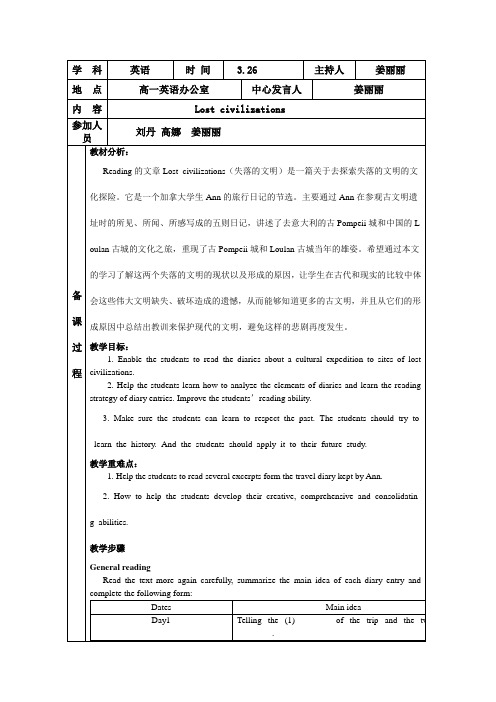
(1) purpose (2)destinations(3)lecture(4)eruption(5)Visiting
(6)amazed(7)Tired(8)excited 9)Introducing(10)discovery)
【设计意图】
由于本文的结构非常清楚,直接要求学生归纳出每一个自然段的大意。这样学生很容易就能从总体上把握文章的结构。为了帮助学生归纳总结大意,老师降低难度,设计了任务型填空。
教学步骤
General reading
Read the text more again carefully, summarize the main idea of each diary entry and complete the following form:
Dates
Main idea
Day1
Telling the (1)________ of the trip and the two (2) _lp the students to read several excerpts form the travel diary kept by Ann.
2. How to help the students develop their creative, comprehensive and consolidating abilities.
【设计说明】通过讨论的话题引申出保护人类文明的重要性,启发学生思考,从课文内容向人文层面的提升,同时也激励学生树立正确积极的人生观与价值观。
备课反思:
“失落的文明”这一主题对于学生来说有点遥远。但通过相关资料、图片及视频,学生很快对本课内容产生了兴趣。总的来说,要注重对合作教学和任务型教学的合理运用。同时也对学生进行了情感教育,让学生在古代和现实的比较中体会这些伟大文明缺失、破坏造成的遗憾,从而能够知道更多的古文明,并且从它们的形成原因中总结出教训来保护现代的文明,避免这样的悲剧再度发生。升华了文章的主题。
高一集体备课教案模板03
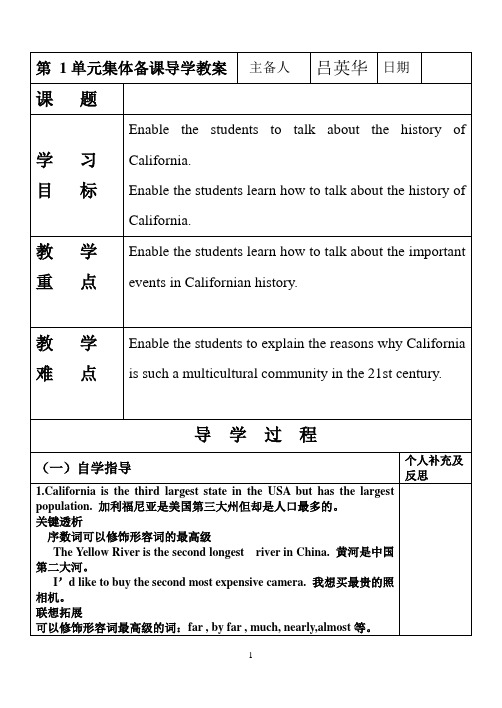
10. nationality n国籍
1). She has American nationality but lives inChina.她是美国国籍但住在中国。
2). ---你是哪国人?
---中国人
-- What’s your nationality?
It is likely/possible/probable that…….…….是可能的
关键透析
sb/sth is likely to do sth
某人/物有可能做某事
注意: likely比较级为likelier,最高级为likeliest
e.g. She is ______to succeed.(likely)
It is hoped that the cost of medical care can be cut down.
9. mix v.混合n.混合,混乱
1). We have to come up with a mix (n. )of policies to please the voters.(折中)
She declared herself to be innocent.她声称自己无罪。
He declared that it was true.他声明此事属实.
3) . To make a full statement申报
Have you anything to declare?
联想拓展
announce v. / n宣布,宣告(把大家所关心的事情,特别是有新闻价值的,做一般或正式的宣布)
have a population of….有多少人口
bookunit高一集体备课周教案
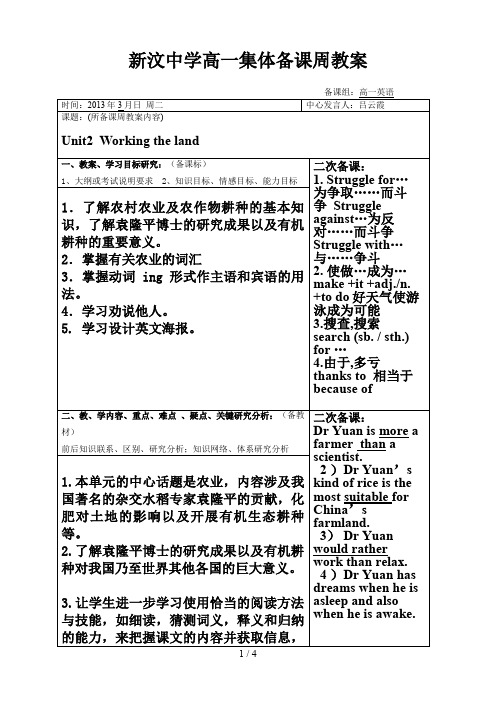
2.了解袁隆平博士的研究成果以及有机耕种对我国乃至世界其他各国的巨大意义。
3.让学生进一步学习使用恰当的阅读方法与技能,如细读,猜测词义,释义和归纳的能力,来把握课文的内容并获取信息,处理信息。
Main idea of the passage
Chemical fertilizers can cause many problems, so organic farming is becoming
more popular.
3.动名词的理解较难,教师要详细归纳并举例说明其用法。
四、教法、学法研究:(备教法、学法)
2.掌握有关农业的词汇
3.掌握动词ing形式作主语和宾语的用法。
4.学习劝说他人。
5.学习设计英文海报。
二、教、学内容、重点、难点、疑点、关键研究分析:(备教材)
前后知识联系、区别、研究分析;知识网络、体系研究分析
二次备课:
Dr Yuan ismorea farmerthana scientist.
(2008·浙江卷)Some children want to challenge themselves by learning a language different from ______ their parents speak at home.
A.whatB.that
C.whichD.one
二次备课:
Seeing is believing. Helping her is my duty.Talking mends no holes.
Working with you is a pleasure
高一年级英语集体备课教案三
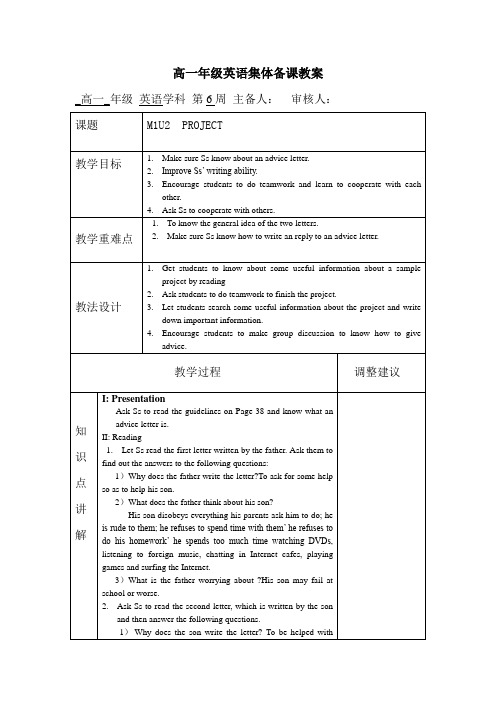
高一年级英语集体备课教案_高一_年级英语学科第6周主备人:审核人:课题M1U2 PROJECT教学目标 1.Make sure Ss know about an advice letter.2.Improve Ss’ writing ability.3.Encourage students to do teamwork and learn to cooperate with eachother.4.Ask Ss to cooperate with others.教学重难点1.To know the general idea of the two letters.2.Make sure Ss know how to write an reply to an advice letter.教法设计1.Get students to know about some useful information about a sampleproject by reading2.Ask students to do teamwork to finish the project.3.Let students search some useful information about the project and writedown important information.4.Encourage students to make group discussion to know how to giveadvice.教学过程调整建议知识点讲解I: PresentationAsk Ss to read the guidelines on Page 38 and know what an advice letter is.II: Reading1. Let Ss read the first letter written by the father. Ask them to find out the answers to the following questions:1)Why does the father write the letter?To ask for some help so as to help his son.2)What does the father think about his son?His son disobeys everything his parents ask him to do; he is rude to them; he refuses to spend time with them’ he refuses to do his homework’ he spends too much time watching DVDs, listening to foreign music, chatting in Internet cafes, playing games and surfing the Internet.3)What is the father worrying about ?His son may fail at school or worse.2.Ask Ss to read the second letter, which is written by the sonand then answer the following questions.1)Why does the son write the letter? To be helped with知识点讲解some problems he has at home.2) What are his problems?His father does not listen to him when he wants to do something or suggests an idea; he shouts at him when he tries to talk to him; when he refuses to listen to his father, his father tells his mother and they fight like crazy; his parents always make him do things he doesn’t like; they call him selfish and unloving when he wants to be alone; his father gets very angry when he plays foreign music; he sends him to bed or tells him to study when he watches a DVD; he forbids him from meeting his friends at the Internet café.3) How does he feel about his father?He loves his father a lot. He hopes his father can understand him better and respect the things he wants to do. III: Language Focus1.as though= as if①用在look, smell, taste, sound, walk后面,议论可能、真实的事情。
高一下集体备课电子稿(Unit
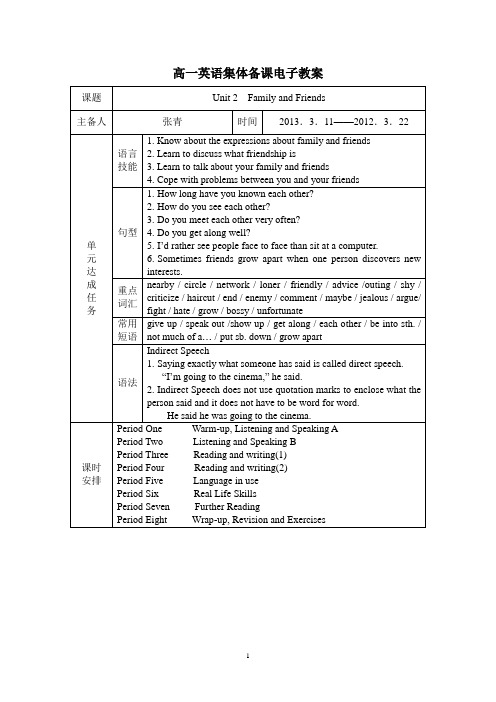
高一英语集体备课电子教案课题Unit 2 Family and Friends主备人张青时间2013.3.11——2012.3.22单元达成任务语言技能1. Know about the expressions about family and friends2. Learn to discuss what friendship is3. Learn to talk about your family and friends4. Cope with problems between you and your friends句型1.How long have you known each other?2.How do you see each other?3.Do you meet each other very often?4.Do you get along well?5.I‟d rather see people face to face than sit at a computer.6.Sometimes friends grow apart when one person discovers newinterests.重点词汇nearby / circle / network / loner / friendly / advice /outing / shy / criticize / haircut / end / enemy / comment / maybe / jealous / argue/ fight / hate / grow / bossy / unfortunate常用短语give up / speak out /show up / get along / each other / be into sth. / not much of a… / put sb. down / grow apart语法Indirect Speech1.Saying exactly what someone has said is called direct speech.“I‟m going to the cinema,” he said.2.Indirect Speech does not use quotation marks to enclose what theperson said and it does not have to be word for word.He said he was going to the cinema.课时安排Period One Warm-up, Listening and Speaking A Period Two Listening and Speaking BPeriod Three Reading and writing(1)Period Four Reading and writing(2)Period Five Language in usePeriod Six Real Life SkillsPeriod Seven Further ReadingPeriod Eight Wrap-up, Revision and Exercises课时The first period 课型New lesson 教学内容Warm-up, Listening and Speaking A教学目标Knowledge Objectives:1. Learn and master the following words and the expressions about family and friends2. Learn to ask and answer questions about family and friends inEnglish3. Learn to interview the partner about his /her family and friends Ability ObjectivesTrain the students‟ abilities of listening and speakingFeeling Objectives:1.Train the students‟ learning family and friends.2.Motivate the students‟ study motivation.教学重点Learn to use the expressions about family and friends to communicate with others教学难点Learn to master listening skills教学过程复备Step One: Lead inT: Do you have friends?S1: Yes, a lot.T: What are your friends like?S1: Slim, patient and humorous.T: Where do you live?S2: In Guan yun.T: Do you live alone or with your family?S2: With my parents.…Step Two: Warm-upActivity One:How well do you know your family and friends? Answerthe questionnaire below and find out.Activity Two:Use the questionnaire to interview your partner abouthis/her family and friends. Write down your partner‟sanswers. Then tell the class the interesting things abouthim/her.Step Three: Listening and speaking AT: Look at the picture, she is Sue‟s aunt, she is coming tovisit her. Can you guess: How often does the auntprobably visit Sue‟s family?Listen to the tape, and then check your prediction.Listen again. Then underline the sentences talking about family relationships.(Bb) Useful expressions:Asking about relationships:Is your mother‟s sister?How long have you known each other?Do they live far away from you?Do you meet each other very often?How often do you see each other?Possible responses:No. She‟s my father‟s sister.A very long time, since I was a kid.No. We live in the same neighborhood.Seldom, but we call a lot.Occasionally.Step Four: PracticeActivity 3: Ask your partner about his/her friends/relatives with the above expressions. Then complete thetable below.Activity 4: Give the students three minutes to work in pairs and complete the conversation on the page of22.Step Five: language points1. get along with sb.与get on with sb.2. nearby 可用作副词或形容词Step Six: Homework1.Recite the new words and expressions2.Recite the dialogue教学反思课时The second period 课型New lesson 教学内容Listening and Speaking B教学目标Knowledge Objectives:1. Learn to master the words and expressions related to the listening passage.2. Finish the exercises related to the listening passage.Ability ObjectivesTrain the students‟ abili ties of listening and speakingFeeling Objectives:1.Train the students‟ learning interests.2.Establish the students‟ self-confidence.教学重点Learn to master listening skills教学难点How to improve the abilities of getting more information from the listening passage.教学过程复备Step One: RevisionAsk some students to recite the dialogueStep Two: Lead inAsk and answer:T: Do you like surfing on the Internet?S: Yes, very much.T: Have many friends on the Internet?S: Yes, all over the world.T: Do you like making friends?S1: Yes, I have many friends in the school.Step Three: New wordsLearn the words and expressions below:circle / network / lonerRead the new words and explain them to the students. Step Four: ListeningI. Look at the picture and guess what relationship they are. First go through these activities and try to get the main idea. Then complete the exercises in Activity Six and Activity Seven. Listen again if necessary. Finally check the answers.II. Language points:1.be into sth. 对......特别感兴趣,很喜欢2.not much of a... 相当于not a good... 意为“不是一个好的......”3.would rather (not) do 意为“宁愿(不)做某事”would rather... than... 意为“比起......来宁愿做某事”Step Five: PracticeI. Activity Eight:Talk about the circle of friends with your classmates and fill in the form on page 24.II. Activity Nine:1. Finish the paragraphs on page 24 with the information you‟ve gotten in Activity eight.2. Then practice in pairs. And then get the students to perform in class.Step Six: HomeworkPreview the next passage教学反思课时The third period 课型New lesson 教学内容Reading and Writing(1)教学目标Knowledge Objectives:1. Learn to get the general idea of the passage.2. Learn to talk about friendship problems3. Learn to how to give adviceAbility ObjectivesTrain the students‟ abilities of reading Feeling Objectives:1. Train the students‟ learning interests.2. Improve the students‟ team spirits教学重点Learn to get the general idea of the passage.教学难点Learn to how to give advice教学过程复备Step One: RevisionTranslate some expressions:be into sth. / not much of a... / would rather (not) do/ would rather... Than...Step Two: Lead inLook at the picture.T: Do you have many friends?S: Yes, a lot of friends.T: Good. But sometimes do you have any problemswith your friends ?S: Yes, we often have some unhappy problems.T: Do you know how to solve them?S: Sometimes can,but lots of time can‟t solve themwell.T: Do you want to know how to solve theseproblems well?S: Yes, of course.Step Three: ReadingGet the students to listen to the tape and try to getthe main ideas. Then answer the question: What does Dr.Green do? (Activity One)Activity Two:T: Read the passage again and complete thequestions and advice.Step Four: DiscussionT: Do you like making friends?S1: Yes / No.T: How do you know each other?S2: We .T: Do you get along well with each other ?S3: Yes.T: What about you?S4: ______.Then get the students to discuss it with each other. Practice in pairs. Then get them to perform in class. Step Five:Activity ThreeRead the passage again and circle the best answer.Step Six: ExercisesTranslate some sentences1.Then she laughed at my new haircut and said I ought to wear a hat.2.Tell her that these comments hurt your feelings.3.Now he hangs out with his new friends.4.He says I shouldn‟t tell him what to do.Step Seven: HomeworkRead the passage fluently教学反思课时The four period 课型New lesson 教学内容Reading and writing(2)教学目标Knowledge Objectives:1. Learn and master the important language points in the passage.2. Learn to master the usage of the Indirect Speech.Ability ObjectivesTrain the students‟ abilities of writingFeeling Objectives:1. Train the students‟ learning interests.2. Mo tivate the students‟ study motivation.教学重点Learn and master the important language points in the passage. 教学难点Train the students‟ abilities of writing using the Indirect Speech.教学过程复备Step One: RevisionRevise the main idea of the passage.Read the passage one by one.Step Two: ReadingActivity 4: Read the paragraph on page 27. Underline theproblems that the writer mentions. Then find out thesolutions that the writer suggests.Activity 5: Think of another problem affecting your schoollife and suggest solutions.Step Three: Language Points1.give up 意为“投降,认输,放弃”give up on sb. 意为“对......不再抱希望”give in 屈服,投降,认输give off 发出,放出(气味,热,光等)give back 归还2.speak up 意为“大声点说,明确表态”3.put sb. down 意为“使某人(当众)出丑”4.show up 意为“如约赶到,露面”ed to do sth. 过去常常做某事be/get used to doing sth. 习惯于做某事be/get used to do sth. 被用来做某事6.grow apart 产生隔阂7.get/be/become involved in sth. 参与某事,与某事有关联Step Four: HomeworkRecite the important sentences教学反思课时The five period 课型New lesson 教学内容Language in use教学目标Knowledge Objectives:1. Learn and master the pronunciation of three phonetics:/s//z/ /iz/ and pay attention to the pronunciation rules ofcombination of letters2. Learn to master the Indirect SpeechAbility ObjectivesTrain the students‟ abilities of using English.Feeling Objectives:1.Train the students‟ learning interests.2.Motivate the students‟ study motivation.3.Improve the students‟ self-confidence.教学重点Learn to master the Indirect Speech教学难点Correct the students‟ pronunciation of three phonetics.教学过程复备Step One: Lead inPresent some sentences. Then get the students to readthem and try to translate them.1. No pains, no gains. (不劳无获。
高中学校高一英语集体备课方案
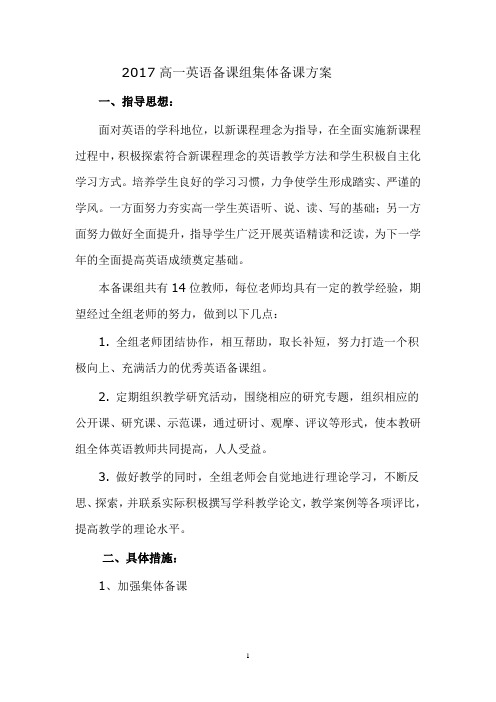
2017高一英语备课组集体备课方案
一、指导思想:
面对英语的学科地位,以新课程理念为指导,在全面实施新课程过程中,积极探索符合新课程理念的英语教学方法和学生积极自主化学习方式。
培养学生良好的学习习惯,力争使学生形成踏实、严谨的学风。
一方面努力夯实高一学生英语听、说、读、写的基础;另一方面努力做好全面提升,指导学生广泛开展英语精读和泛读,为下一学年的全面提高英语成绩奠定基础。
本备课组共有14位教师,每位老师均具有一定的教学经验,期望经过全组老师的努力,做到以下几点:
1. 全组老师团结协作,相互帮助,取长补短,努力打造一个积极向上、充满活力的优秀英语备课组。
2. 定期组织教学研究活动,围绕相应的研究专题,组织相应的公开课、研究课、示范课,通过研讨、观摩、评议等形式,使本教研组全体英语教师共同提高,人人受益。
3. 做好教学的同时,全组老师会自觉地进行理论学习,不断反思、探索,并联系实际积极撰写学科教学论文,教学案例等各项评比,提高教学的理论水平。
二、具体措施:
1、加强集体备课
1。
高中英语集体备课教案范文集锦
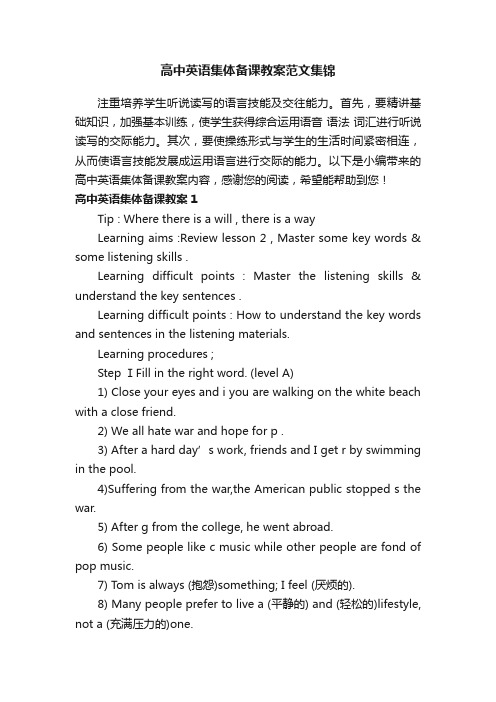
高中英语集体备课教案范文集锦注重培养学生听说读写的语言技能及交往能力。
首先,要精讲基础知识,加强基本训练,使学生获得综合运用语音语法词汇进行听说读写的交际能力。
其次,要使操练形式与学生的生活时间紧密相连,从而使语言技能发展成运用语言进行交际的能力。
以下是小编带来的高中英语集体备课教案内容,感谢您的阅读,希望能帮助到您!高中英语集体备课教案1Tip : Where there is a will , there is a wayLearning aims :Review lesson 2 , Master some key words & some listening skills .Learning difficult points : Master the listening skills & understand the key sentences .Learning difficult points : How to understand the key words and sentences in the listening materials.Learning procedures ;Step ⅠFill in the right word. (level A)1) Close your eyes and i you are walking on the white beach with a close friend.2) We all hate war and hope for p .3) After a hard day’s work, friends and I get r by swimming in the pool.4)Suffering from the war,the American public stopped s the war.5) After g from the college, he went abroad.6) Some people like c music while other people are fond of pop music.7) Tom is always (抱怨)something; I feel (厌烦的).8) Many people prefer to live a (平静的) and (轻松的)lifestyle, not a (充满压力的)one.9) There are so many people in the (拥挤的)street. I can’t (忍受) it.10) Nowadays, many (志愿者) go to the (遥远的,偏远的)area to (支持)the development of education there.11) __________________ (组织) the spring outing was really a ______________ (挑战) for me.12) Because of the bad weather, the farmers’ income has ______________ (降低) by 20%.13) Generally speaking, the aged enjoy_______________ (古典的) music while the young____ (更喜欢) pop music.14) They put on___________________ (广告) in the newspaper to promote their products。
外研版 高一英语 集体备课材料
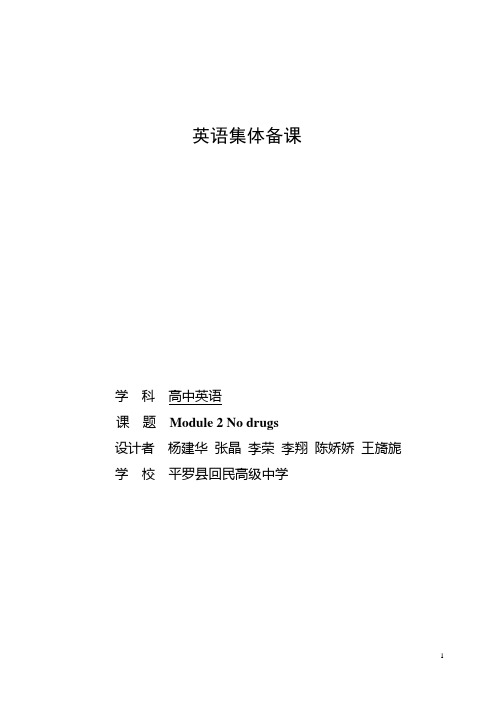
英语集体备课学科高中英语课题Module 2 No drugs设计者杨建华张晶李荣李翔陈娇娇王旖旎学校平罗县回民高级中学Module 2 No drugs一、教材分析要求通过听的活动了解和学习有关吸毒和犯罪的词汇,培养表达结果,作总结逻辑思维能力和获取信息的能力。
并以听说为主线,对吸毒这一主题进行延伸和拓展。
二、教学目标本模块是通过学习表达吸毒及其危害的词语和其它语言形式,养成良好生活习惯,教育学生关爱社会,关爱他人,远离毒品。
三、语言知识目标:1、词汇有:burglary, connection, crime, criminal, illegal, ratio, shoplifting, treatment2、语言技能目标:听懂有关吸毒及其危害的话语并获取信息,学会抓住关键意见,进行summarizing,并用英语讨论,表达吸毒的危害。
3、情感目标:提高自我保护意识,养成良好生活习惯,珍爱生命,远离毒品。
Period 1 Introduction; Speaking; Writing1.During the 1990s, 21 million people died as a result of smoking cigarettes.as a result of\ because of + n. pron. v-ing 因为,由于由于粗心驾驶的结果,他最后被送进了医院.He ended up in hospital as a result of his careless driving.as a result 表示结果; as a result of 表示前面的原因.2. Thirteen people die every hour from illnesses related to smoking tobacco, such as cancer,bronchitis and heart disease.die of (内因) cold, hunger, sadness, cancer, old age, thirstdie from(外因) wound, lack of food, accident, smokingrelate vt. 联系relate A to \ with B 将……联系起来be related to = be connected with 与……有联系The matter _____ your career can not be taken for granted.A. relates toB. related toC. connectsD. connectedPeriod 2 Reading and Vocabulary1. danger n. 危险;风险eg. In war, a soldier's life is full of danger.在战争中,士兵的生命充满了危险。
- 1、下载文档前请自行甄别文档内容的完整性,平台不提供额外的编辑、内容补充、找答案等附加服务。
- 2、"仅部分预览"的文档,不可在线预览部分如存在完整性等问题,可反馈申请退款(可完整预览的文档不适用该条件!)。
- 3、如文档侵犯您的权益,请联系客服反馈,我们会尽快为您处理(人工客服工作时间:9:00-18:30)。
高一英语备课组集体备课资料主备人:薛丽芳成员:韦静王荣陈曦郭子倩备课内容:A night the earth didn’t sleep[教学目标]一、知识目标1.充分理解课文内容并完成所给的阅读任务。
2.掌握一些阅读技巧和方法。
3.学习有用的单词、短语和表达方式。
二、能力目标在运用语言的过程中培养学生的观察力、分析力、想象力和自学能力,帮助学生加强记忆力,提高思维能力和运用英语的综合能力,激发创造能力。
三、情感、态度与价值观目标①通过学习本文,使学生提高对自然界中灾难的警惕及采取预防措施。
②学习唐山人民勇敢面对自然灾害,积极进行灾后重建的精神及中华民族“一方有难,八方支援”的伟大民族精神。
③在教学活动中培养学生的合作精神和互助精神。
[教学重点]①阅读并理解课文,从而使学生了解地震前兆、地震危害和震后救援等相关知识。
②通过对本篇课文的阅读,掌握各种阅读技巧。
[教学难点]①阅读并理解课文,从而使学生了解地震前兆、地震危害和震后救援等相关知识。
②通过对本篇课文的阅读,掌握各种阅读技巧。
[教学方法]我在教学中淡化语言点和语法知识的简单传授,采用任务型教学法和小组合作探究学习法,从而扩大课堂的语料输入量及学生的语言输出量,注重培养学生“课前、课中、课后”良好的学习习惯。
我具体采用了以下教学方法:①提问法——逐步引导,逐渐深入;②自主探究法——学生实践,巩固提高;③归纳法与整理法——学生实践,形成积极的抽象思维;④讨论法——积极参与,总结规律,形成正确的自我评价与相互评价;⑤点拨法——展开联想,拓宽思路。
[教学时数] 1课时。
[教学过程]Step 1 Leading-in 导入Show some pictures to the students.Teacher: First let’s get to know the man, who is called Mr. Nature. He is very emotional. When he is happy, he stays calm and shows us beautiful natural scenery. But when he gets angry, he becomes a troublemaker and causes many natural disasters. Can you name the following natural disasters?Suggested answers: Flood, drought, fire, volcano, typhoon, tornado, rock-mud flow, snowslide, earthquakeTeacher: As we all know, an earthquake is a kind of common disasters. It can cause great damage to people. Have you ever experienced an earthquake?(Students’ answers)Teacher: Can you describe your feelings at that time?(Students’ answers)Teacher: Why does an earthquake happen?Suggested answers: Scientists believe that the surface of the earth is covered by a number of moving plates such as the Pacific plate, the Indian plate, the Eurasian plate, and so on. Sometimes two plates move towards and push against each other. Sometimes they stop for years but at other times they jump and an earthquake is felt. An earthquake is the result of the movement of these plates.Teacher: We know China is a country where many earthquakes happen. Why does China have a lot of earthquakes?Suggested answers: Because the Pacific plate is pushing China from the east and the Indian plate is pushing China from the southwest. The power of this movement created the Himalayas and Mount Qomolongma. It now causes earthquakes in China. Take the Wenchuan earthquake for example, the Indian plate moved northwards and put pressure on the Eurasian plate. It led to the rise of the Qinghai-Tibet Plateau. Then the risen Qinghai-Tibet Plateau moved eastwards and put pressure on Sichuan Basin. At last, the Wenchuan earthquake happened. Wenchuan is located on solid rock of the active earthquake belt, which makes the quake spread very far. It was felt in many provinces in China, including Shaanxi Province.Teacher: Usually we can see dark clods in the sky before rain. Dark clouds are a sign of rain. Similarly, something unusual often happens before an earthquake. What do you thinkwill happen before an earthquake?Suggested answers: There are bright lights in the sky. Chickens are flying and dogs are barking, and pigs and cows are too nervous to eat. Fish jump out of the pond, and mice ran widely out of the fields. The well has deep cracks in it and the water in it rises and falls. Teacher: If we can read these signs from natur e, it’s very useful for us to make good preparations for the coming disaster. Ok. 34 years ago, a strong earthquake hit Tangshan city and destroyed everything. Now let’s learn about the terrible earthquake. Turn to page 26. Look at the reading passage—A Ni ght the Earth Didn’t Sleep. What information does the writer try to give us through the title? / What does the title mean?Suggested answers: “The earth didn’t sleep” means the earth was active or the earth shook. “A Night the Earth Didn’t Sleep” is a poet ic way of saying that an earthquake happened at night. The title attracts people’s attention.【设计说明】为了调动学生的学习积极性,导入部分采用了多媒体动画、图片、文字等,形象直观。
导入部分由三个步骤构成:①首先用多媒体展示一个动画卡通人物“自然先生”,他是一个很情绪化的人。
当他高兴时,他心平气和,展现自然美景;但当他生气发怒时,他变成一个制造麻烦的人,造成许多自然灾难。
同时,展现一些包括地震在内的常见自然灾害图片,请学生辨认。
通过将自然界拟人化,更能激发学生的学习兴趣,调动学生的学习积极性。
②询问学生是否经历过地震,谈论2008年5月12日发生的四川汶川地震。
继而探讨“为什么发生地震?”“中国为何多发地震?”等问题,提高学生对地震成因的认识。
③让学生讨论地震前可能出现的征兆,使学生明白如果我们能够了解并认识地震前的预兆,就能提前做好准备,让更多的人获得求生的机会,减少或避免不必要的损失。
最后引出本文A Night the Ear th Didn’t Sleep,并让学生对文章标题进行理解。
Step 2 Fast reading 泛读Read the text quickly and try to finish the following exercises.A. New words or phrasesburst: break open because of pressure from insideat an end: finishednation: all the people in the countrysteam: gas that hot water gives outin ruins: destroyedextreme: very great in degreeuseless: of no useshocked: surprised very muchrescue: save somebody or something from dangershelter: a place that protects you from the weather or dangerB. Questions1. When did the Tangshan earthquake happen?Suggested answers: The earthquake happened at 3:42 am on July 28, 1976.2. How many people were killed or injured in the earthquake?Suggested answers: More than 400, 000 people were killed or injured in the earthquake.3. Was all hope lost? How did the army help the people there after the earthquake? Suggested answers: No, all hope was not lost. The army sent 150,000 soldiers to Tangshan to help the rescue workers. The army organized teams to dig out those who were trapped and to bury the dead.C. Structure of the text1. Match the paragraphs in the right column with their headings in the left column. There is one extra heading which you do not need.2. Divide the text into 3 parts and find out the time of each part.【设计说明】我在黑板上列出了本文出现的几个生词并用英语解释,锻炼学生的英语思维。
